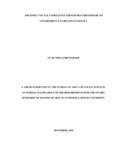| dc.description.abstract | This study endeavored to establish the effects of tax compliance strategies expenditure on government tax revenue. The specific objectives of the study were to: establish the effect of tax payer education expenditure on tax revenue, determine the effect of improved tax payer services expenditure on tax revenue, and assess the effect of law enforcement expenditure on tax revenue as well as determine the effect of technology adoption expenditure on tax revenue. The study was pegged on three theories namely; the economic deterrence theory, fiscal exchange theory and the regulatory compliance theory. Revenue data between 1980 and 2015 was used in the study. Ordinary Least Squares technique (OLS) was employed to establish the long run relationship between expenditure on taxpayer education, tax payer services, expenditure on law enforcement and adoption of technology on government tax revenues. Breusch-pagan test was used to test for heteroscedasticity and multi-collinearity, Variance Inflation Factor method was used. The study tested for serial autocorrelation since the data was of time series nature. The Jarque-Bera test was also conducted to test normality for the error term. Impulse response and variance decomposition were used to test the relation between tax compliance strategies expenditure and tax revenue. Further, the relationship between variables was established through correlation analysis. The results of the study show that the expenditures by the tax authority on the use of technology, law enforcement and the tax payer education were statistically significant in explaining the variations in tax revenue. The relationship between the three expenditures and revenue is positive, which implies that as the tax authority increases its expenditure on law enforcement, technology or on tax payer education, it is expected that tax revenue will grow. Contrary to these findings is the fact that the expenditure of the tax authority on improved tax payer services is not significant in explaining the variations in tax revenue. | en_US |

